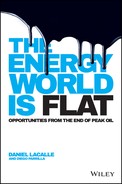Chapter Ten
Flattener #7 – Demand Destruction
There can be economy only where there is efficiency.
Benjamin Disraeli
I grew up in the 1970s. I was too young to remember the first oil shock, but I can recall with great nostalgia those cold winters sitting next to the wood fires. And that, despite our complaints, my parents would only set the electric heating on at night. Electricity prices had skyrocketed, but the main reason why the house felt so cold was the very poor insulation. The windows seemed to whistle when the wind was blowing hard. No matter how high we set the thermostat, the house always seemed to be freezing. Plus the wood fires were more fun.
Today, energy efficiency and conservation are more relevant than ever. Buildings and residential are the largest energy consumers, with nearly 35% share of global energy consumption and much stricter regulation for energy savings is in place today.
Clearly, the path taken in terms of energy efficiency will be critical to the future of power consumption worldwide.
More with less
Efficiency is about doing “more with less”. It is about being smarter about how the resources are produced, refined, transported, and consumed.
As discussed, game changers tend to result in “quantum leaps”, where technology opens new frontiers and unlocks potential that was known to exist, but was not commercially viable. Game changers are a line in the sand, a “before and after”.
On the other hand, efficiency is about “small steps”, where technology, experience, and better practices allow us to do more with less.
Efficiency of demand, known as energy conservation, is perhaps the best known and most obvious one.
Efficiency of supply, also known as the learning curve, has also had a relentless contribution across all energy sectors, from exploration, production, refining, distribution, and consumption.
Efficiency tends to be dismissed as “too small” and is often missed by the naked eye, but its effect adds up and compounds exponentially.
The demand and supply learning curves have been important contributors to demand destruction.
Yes, they are difficult to model, but they simply cannot be ignored.
Therefore, ignoring the impact of efficiency gains (as is often the case with industry forecasts) has a pessimistic bias by construction, which adds to other similar biases such as ignoring the potential of game changers.
How can we try to estimate what the demand will be in 50 or 100 years without careful consideration of efficiency? Impossible. Yet, most analysts and forecasts do. And, given the negative bias, this is yet another reason why demand expectations tend to be overestimated.
Compounded efficiency adds up and has the potential to help win the battle and dramatically impact long-term balances. Today 1 in 10 barrels of oil produced globally go to US gasoline engines. However, gasoline consumption peaked in the US at c9.3m b/d in 2007, according to UBS.
If the average US car goes from 24mpg to 34mpg then that would cut global oil demand by 3.65 million barrels/day, or around 4%. Indeed, over the long run, the impact of efficiency can be comparable to, if not greater than, any game changer.
The “Invisible Hand” of efficiency
The “invisible hand” of the market (as described by Adam Smith in his book, The Wealth of Nations1) creates the signals and incentives for efficiency gains, without the intervention of governments or regulation. Demand destruction driven by pure market forces.
The “Visible Hand” of efficiency
The “visible hand” of governments provides incentives and mandates for efficiency gains, by monetizing or imposing efficiency gains through the use of “carrots” and “sticks”. Government intervention has been a positive relentless force for energy consumers looking to reduce foreign dependence, conserve resources, and protect the environment.
As we look back in history, efficiency has played a key role.
As we look forward, it is sensible to believe that it will continue to be the case.
